外研社八年级英语下册语法专题复习
外研版丨八年级下册英语各单元重点语法
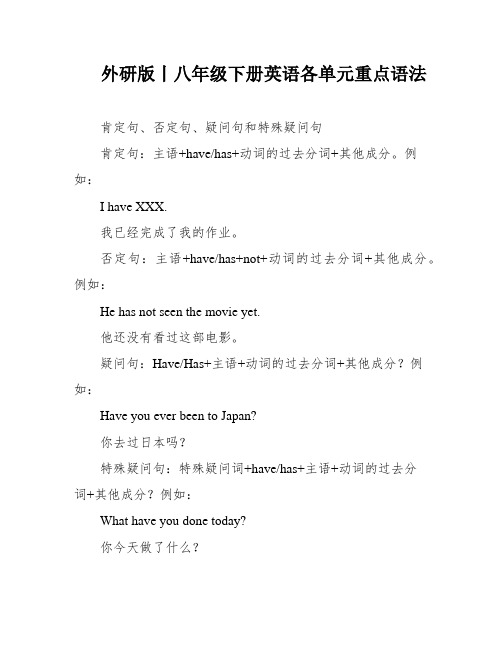
外研版丨八年级下册英语各单元重点语法肯定句、否定句、疑问句和特殊疑问句肯定句:主语+have/has+动词的过去分词+其他成分。
例如:I have XXX.我已经完成了我的作业。
否定句:主语+have/has+not+动词的过去分词+其他成分。
例如:He has not seen the movie yet.他还没有看过这部电影。
疑问句:Have/Has+主语+动词的过去分词+其他成分?例如:Have you ever been to Japan?你去过日本吗?特殊疑问句:特殊疑问词+have/has+主语+动词的过去分词+其他成分?例如:What have you done today?你今天做了什么?In Module 3.we will learn about the present perfect tense。
This tense is used to express XXX and have an impact on the present。
We can use words like just。
already。
and yet to emphasize or explain the n。
For example。
"I have just heard the news," "Astronauts have already been to the moon," and "He has just XXX." Just means "recently," already means "before now,"and both are used in affirmative sentences after have/has。
Yet is used in negative sentences to mean "not yet" and implies that the n may happen in the future.Scientists have not yet received any XXX life。
新外研版八年级下册英语期末总复习知识点
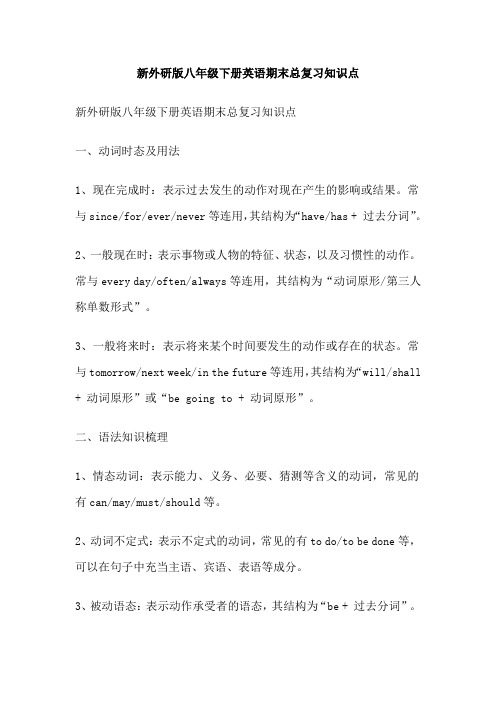
新外研版八年级下册英语期末总复习知识点新外研版八年级下册英语期末总复习知识点一、动词时态及用法1、现在完成时:表示过去发生的动作对现在产生的影响或结果。
常与since/for/ever/never等连用,其结构为“have/has + 过去分词”。
2、一般现在时:表示事物或人物的特征、状态,以及习惯性的动作。
常与every day/often/always等连用,其结构为“动词原形/第三人称单数形式”。
3、一般将来时:表示将来某个时间要发生的动作或存在的状态。
常与tomorrow/next week/in the future等连用,其结构为“will/shall + 动词原形”或“be going to + 动词原形”。
二、语法知识梳理1、情态动词:表示能力、义务、必要、猜测等含义的动词,常见的有can/may/must/should等。
2、动词不定式:表示不定式的动词,常见的有to do/to be done等,可以在句子中充当主语、宾语、表语等成分。
3、被动语态:表示动作承受者的语态,其结构为“be + 过去分词”。
三、重点词汇及短语1、unit 1: invitation, accept, refuse, reply, minute, menu, delicious, uncomfortable2、unit 2: enjoy, success, achieve, challenged, disappointed, uncomfortable3、unit 3: afford, suggest, order, additional, special, offer4、unit 4: allow, mind, message, convenient, uncomfortable5、unit 5: taste, prefer, juice, soft drink, coffee, tea四、写作技巧提升1、段落结构:在写作时,要注意段落的排版,每个段落要有明确的主题,并且段落之间要有逻辑关系。
完整版)新外研版八年级下册英语复习知识点

完整版)新外研版八年级下册英语复习知识点Module 1:1.A XXX2.Have a try: to attempt something3.Have a sweet tooth: to have a preference for sweet food4.A lot of: a large quantity of5.Be proud of: XXX6.Take part in: to participate in7.Would you like to try some。
= Do you want to try a piece?8.A bit sour: slightly sour9.In the middle of: in the center of10.Shall I。
Is it okay if I。
11.(Not) be sure: (Not) be XXX12.What's the matter with you。
= What's wrong with you。
= What's troubling you?13.Be XXX: XXXBe XXX14.Hear from sb: XXX15.Be great to do sth: to be happy to do something16.Arrive at/in = reach = get to: to arrive at a n17.Each other: mutually18.Thanks for doing sth: expressing gratitude for doing something19.Sound like: to sound similar to20.Sb XXX: XXX some time doing something21.As well: also (used at the end of a sentence)22.Be good at + noun/gerund: to be skilled at something23.For a few days: to last for a few daysIn a few days: in a few days' timeabout doing: suggesting an n25.At first: initially26.In the right way: in the correct manner27.Sb can't wait to do sth: someone is eager to do something28.Wait for sb: to wait for someone29.Be like: to ask about someone's characterLook like = do(es) like: to ask about someone's appearance30.Talk with sb: to have a XXXdo sth: to be able/should do something32.One of + plural noun: one of many33.Get good marks: to achieve good gradesModule 2:34.First prize: the XXX.st year。
外研版八下英语复习笔记语法

外研版八下英语复习笔记语法集团档案编码:[YTTR-YTPT28-YTNTL98-UYTYNN08]四册笔记:M1语法:1.感官系动词五“起来”,形容词紧紧跟上来。
lookn._______v._______smell,n._______v._______tasten._______v._______ soundn._______v._______feeln._______v.________2.感官实义动词四看二听:see,watch,find,notice,hear,listento,接v原表示经常或过程,接ing表示正在。
M1,U11.Whatadelicioussmell!多香的味道。
感叹句:How+adj(+主谓)!What+a/an+adj+n(+主谓)!2.Wouldyouliketodosth=Doyouwanttodosth 你想要做某事吗?3.trysome/tryapiece/haveatry.尝一些,尝一块,尝一尝。
4.yes,please./No,thanks.(当别人主动提供你东西时的答语。
)5.What’sthatontop顶部是什么?6.I’mafraid+that从句/ofsth/todosth我恐怕…7.Itdoesn`tsmellfresh.感官动词借助于助动词来完成句型变化。
8.abitsour.有点酸。
abit+n=alittle+n/abit+adj=alittle+adj9.bedone(被)做完了10.inthemiddle.在中间11.makeanapplepie做个苹果馅饼12.haveasweettooth爱吃甜食13.ShallI/wedosth我、我们做某事好吗?14Areyousure+todosth/ofsth/that从句…你确定….吗?15.strawberryjam草莓酱16.Everythingtastessosweet!所有东西都尝起来这么甜。
外研版八年级下册语法知识点

外研版八年级下册语法知识点本文档将介绍外研版八年级下册涉及的主要语法知识点。
一. 动词的时态1. 一般现在时:表示经常性的行为、存在或事实;使用动词原形。
2. 现在进行时:表示正在进行的动作;使用be动词的现在分词形式+动词-ing。
3. 一般过去时:表示过去发生的动作;动词过去式。
4. 过去进行时:表示在过去某一时间正在进行的动作;过去式的be动词+动词-ing。
二. 名词性从句1. 主语从句:用作句子主语的从句。
2. 宾语从句:用作句子宾语的从句。
3. 表语从句:用作句子表语的从句。
4. 定语从句:用来修饰名词或代词的从句。
三. 动词的语态1. 主动语态:表示主语是动作的执行者。
2. 被动语态:表示主语是动作的承受者。
四. 状语从句1. 时间状语从句:表示时间的从句。
2. 地点状语从句:表示地点的从句。
3. 原因状语从句:表示原因的从句。
4. 结果状语从句:表示结果的从句。
五. 形容词和副词的比较级与最高级1. 形容词比较级:表示两者间的比较;原形+er。
2. 形容词最高级:表示三者或三者以上的比较;原形+est。
3. 副词比较级:表示程度上的比较;在副词前加more。
4. 副词最高级:表示程度上的最高水平;在副词前加most。
六. 陈述句、疑问句和祈使句的变化1. 陈述句:陈述事实、真理或观点;句子结构通常为主语+谓语动词+宾语。
2. 疑问句:用于问问题,通常以助动词、情态动词或疑问词开头。
3. 祈使句:用于表示请求、命令、建议等;直接使用动词原形开头。
以上是外研版八年级下册涉及的主要语法知识点。
希望对你有所帮助!。
外研版八下英语复习笔记语法
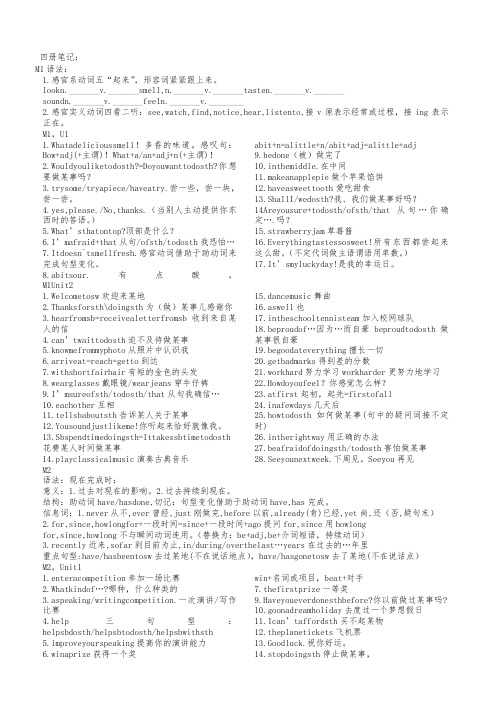
四册笔记:M1语法:1.感官系动词五“起来”,形容词紧紧跟上来。
lookn._______v._______smell,n._______v._______tasten._______v._______soundn._______v._______feeln._______v.________2.感官实义动词四看二听:see,watch,find,notice,hear,listento,接v原表示经常或过程,接ing表示正在。
M1,U11.Whatadelicioussmell!多香的味道。
感叹句:How+adj(+主谓)!What+a/an+adj+n(+主谓)!2.Wouldyouliketodosth?=Doyouwanttodosth?你想要做某事吗?5.6.abit+n=alittle+n/abit+adj=alittle+adj9.bedone(被)做完了10.inthemiddle.在中间11.makeanapplepie做个苹果馅饼…你确4.9.做M22.for,since,howlongfor+一段时间=since+一段时间+ago提问for,since用howlongfor,since,howlong不与瞬间动词连用。
(替换为:be+adj,be+介词短语,持续动词)3.recently近来,sofar到目前为止,in/during/overthelast…years在过去的…年里重点句型:have/hasbeentosw去过某地(不在说话地点),have/hasgonetosw去了某地(不在说话点)M2,Unit11.enteracompetition参加一场比赛2.Whatkindof…?哪种,什么种类的3.aspeaking/writingcompetition.一次演讲/写作比赛4.help三句型:helpsbdosth/helpsbtodosth/helpsbwithsth5.improveyourspeaking提高你的演讲能力6.winaprize获得一个奖win+名词或项目,beat+对手7.thefirstprize一等奖9.Haveyoueverdonesthbefore?你以前做过某事吗?10.goonadreamholiday去度过一个梦想假日11.Ican’tafford sth买不起某物12.theplanetickets飞机票13.Goodluck.祝你好运。
八年级下册外研版初中语法总复习专题(提优版)含答案
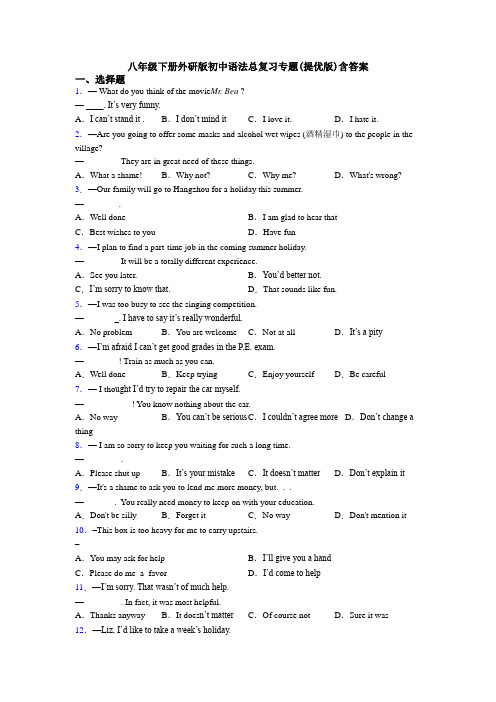
八年级下册外研版初中语法总复习专题(提优版)含答案一、选择题1.— What do you think of the movie Mr. Bea ?—____. It’s very funny.A.I can’t stand it .B.I don’t mind it C.I love it. D.I hate it. 2.—Are you going to offer some masks and alcohol wet wipes (酒精湿巾) to the people in the village?—________ They are in great need of these things.A.What a shame! B.Why not? C.Why me? D.What's wrong? 3.—Our family will go to Hangzhou for a holiday this summer.—________.A.Well done B.I am glad to hear thatC.Best wishes to you D.Have fun4.—I plan to find a part-time job in the coming summer holiday.—________ It will be a totally different experience.A.See you later. B.You’d better not.C.I’m sorry to know that.D.That sounds like fun.5.—I was too busy to see the singing competition.—________. I have to say it’s really wonderful.A.No problem B.You are welcome C.Not at all D.It’s a pity 6.—I’m afraid I can’t get good grades in the P.E. exam.—________! Train as much as you can.A.Well done B.Keep trying C.Enjoy yourself D.Be careful 7.— I tho ught I’d try to repair the car myself.— __________ ! You know nothing about the car.A.No way B.You can’t be serious C.I couldn’t agree more D.Don’t change a thing8.— I am so sorry to keep you waiting for such a long time.— ________.A.Please shut up B.It’s your mistake C.It doesn’t matter D.Don’t explain it 9.—It's a shame to ask you to lend me more money, but. . .— ______ . You really need money to keep on with your education.A.Don't be silly B.Forget it C.No way D.Don't mention it 10.–This box is too heavy for me to carry upstairs.–__________A.You may ask for help B.I’ll give you a handC.Please do me a favor D.I’d come to help11.—I’m sorry. That wasn’t of much help.— ________. In fact, it was most helpful.A.Thanks anyway B.It does n’t matter C.Of course not D.Sure it was 12.—Liz, I’d like to take a week’s holiday.—________. We’re as busy as a bee.A.Go ahead B.With pleasure C.Forget it D.That’s right 13.-Do you think the rain will stop tomorrow?-_____. It has rained for four days. It’s too wet everywhere.A.I hope not B.I don’t think soC.Don’t worry D.I hope so14.—I’m so sorry to keep you waiting for me so long.— ________!A.With pleasure. B.Don’t say so C.I don’t think so D.It doesn’t matter 15.—Would you like a small or a large bowl of noodles? —_______. I’m very hungry. A.A small bowl B.A large bowl C.Yes, please D.No, thanks 16.—Lucy, can you help me with my history?—________. I am good at it.A.With pleasure B.I’m afraid not C.Sorry, I can’t D.No way 17.— Shall we go to Nanjing Green Expo Park to enjoy the beautiful flowers this afternoon?—________. Let’s go there by bike.A.I think so B.That’s all right C.My pleasure D.Sounds great 18.—Sir, this is your order, two chicken hamburgers and a cup of coffee. ________—I’ll ha ve them here.A.For here or to go? B.Something to drink? C.Anything else? D.Is that OK? 19.—I missed the basketball game last Saturday because I had an exam.—________, but it will be repeated on TV.A.Take it easy B.You are lucky C.That’s wonderful D.Never mind 20.—I’m sorry I didn’t make it to your birthday party last night.— ________ I know you are busy recently.A.Why not? B.Don’t mention it.C.No way. D.That’s all right. 21.—Excuse me, can you give me some water? The cup is empty.—________A.Go ahead. B.My pleasure C.At your service D.You’d better not. 22.—You seem so happy today, Jack.—________? I won the first prize in the singing competition yesterday.A.So what B.How come C.Guess what D.Why not 23.—I’m going hiking this afternoon. Would you lik e to go with me?—______, but I must finish my homework first.A.Sorry, I don’t B.That’s right C.I’d love to D.Not at all 24.—________. Where’s the nearest supermarket?—Oh, it’s about 300 meters away, next to a park.A.Thank you B.Excuse me C.Come on D.Th at’s OK 25.—It’s been a wonderful party. Thank you very much?—- ________________.A.With pleasure B.No , thanks C.It’s OK D.I’m glad you26.—Many people think women are better at cooking than men.—________. Most top chefs in the world are men.A.I agree B.I can’t agree more C.Not at all D.That’s not the case 27.—Can you tell me how to get to the park?—________—Thank you all the same.A.Show me the map, please.B.Certainly. It’s opposite the museum.C.Sorry, I don’t know. I’m a stranger here.D.Sure. Turn right and go along Rock Road.28.—All of Mark Twain’s novels are popular.— ________. Especially The Adventures of Tom Sawyer.A.I can’t agree more B.That’s not the case C.That’s not the point D.Don’t mention it 29.—Would you mind if I open the window?—_______.We need fresh air.A.Not at all B.Yes, of course C.You’d better not D.That’s all right 30.—I find it really unwise to go travelling during May Day holiday.—________! Wherever you go, it’s crowded with cars and people.A.Not exactly B.Forget it C.You said it D.It depends 31.—Shall we go to the amusement park right away or the day after tomorrow?—________. Any time will do.A.Excuse me B.Have a good timeC.It’s up to you D.I’m afraid I can’t32.—How do you like coffee, Minnie?—It tastes very terrible. ________.A.I have no idea B.I don’t mind it C.I really can’t stand it D.I can’t afford it 33.—Oh, my love, you say you have ordered a dozen cups of bubble tea (奶茶)?—________A.Agree. B.Forget it. C.I really do. D.Are you kidding me? 34.—He is too short to be a successful basketball player.—________ Every dog has its day.A.I think so. B.It’s hard to say.C.That’s right.D.You’d better not. 35.—Hi, everybody! Here is the music.—________. Let’s dance to the music.A.That’s no good B.Here we go C.That’s a shame D.Have a good time 36.—How about putting some pictures into the report?—________ A picture is worth a thousand words.A.I don’t think so.B.Why not?C.Thank you. D.Don’t mention it.37.—Here’s your change.A.My pleasure. B.Thank you. C.With pleasure. D.No problem. 38.—I wonder if Tenny is doing well in her new school.—________. She is old enough to look after herself well.A.You’re welcome B.Good luck C.It’s a pity D.No need to worry 39.—Why don’t you join in a club to practise speaking English?—________.A.That’s a good idea B.Never mind C.Yes, please D.Thank you 40.—I’ll be away on a business trip. Would you mind looking after my cat?—Not at all. ________.A.It’s my pleasure B.I’d rather not.C.I’d like it.D.With pleasure. 41.—I’ll have a chemistry exam tomorrow.—________!A.Well done B.Congratulations C.You’re welcome D.Good luck 42.—Thank you for helping to build hospitals during this special period.— ________ ! Many hands make light work.A.My pleasure B.All right C.Never mind D.None of my business43.— Would you mind my turning on the TV? The New Year concert has just begun.— ________. Just go ahead.A.Please don’t B.Better not C.Of course not D.I’m afraid not 44.—I prefer to chat online. I’ve got to know ma ny friends on the Internet.—________. Few of them would become your real friends.A.I can’t agree more B.I’m pleased to know thatC.That’s for sure D.That’s not the case45.—I visited the Purple Mountain Observatory by myself last Saturday.—________ Why didn’t you tell me earlier?A.You did? B.I hope not. C.Have a good time. D.I can’t believe it. 46.—Do you think you could finish this project without help?—________. This is not the first time for me.A.Take care B.Don’t worry C.Not exactly D.Hurry up 47.—Mum, Joe has broken a cup!—________. Accidents always happen.A.Pretty good B.Of course C.It doesn’t matter D.That depends 48.— I guess you want to play tennis in the park this afternoon.—_______. That’s exactly what I was thinking just now.A.It’s up to you B.Of course not C.You read my mind D.It’s hard to say 49.—Can I look at the menu for a few more minutes before I decide?—Of course. ________, Sir.A.Make yourself at home B.Enjoy yourself C.It doesn’t matterD.Take your time50.—How about buying that coat?—________. It’s too expensive. I can’t afford it.A.That sounds good B.No way C.Good idea D.What a pity【参考答案】***试卷处理标记,请不要删除一、选择题1.C【解析】本题考查日常用语。
外研版八年级下册英语各单元语法点太全啦
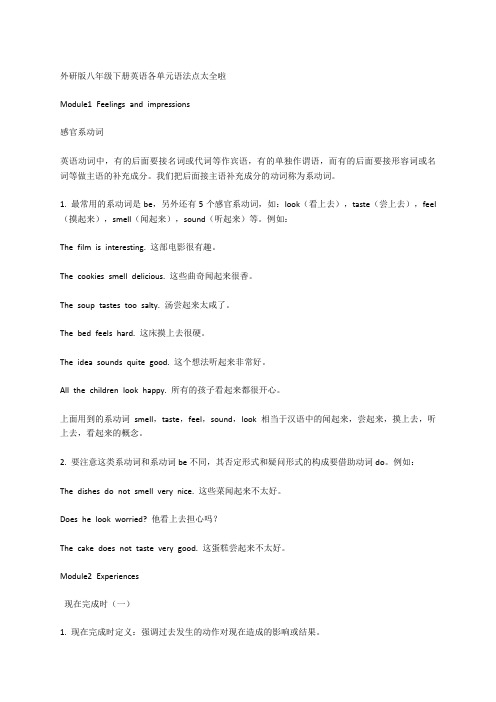
外研版八年级下册英语各单元语法点太全啦Module1 Feelings and impressions感官系动词英语动词中,有的后面要接名词或代词等作宾语,有的单独作谓语,而有的后面要接形容词或名词等做主语的补充成分。
我们把后面接主语补充成分的动词称为系动词。
1. 最常用的系动词是be,另外还有5个感官系动词,如:look(看上去),taste(尝上去),feel (摸起来),smell(闻起来),sound(听起来)等。
例如:The film is interesting. 这部电影很有趣。
The cookies smell delicious. 这些曲奇闻起来很香。
The soup tastes too salty. 汤尝起来太咸了。
The bed feels hard. 这床摸上去很硬。
The idea sounds quite good. 这个想法听起来非常好。
All the children look happy. 所有的孩子看起来都很开心。
上面用到的系动词smell,taste,feel,sound,look相当于汉语中的闻起来,尝起来,摸上去,听上去,看起来的概念。
2. 要注意这类系动词和系动词be不同,其否定形式和疑问形式的构成要借助动词do。
例如:The dishes do not smell very nice. 这些菜闻起来不太好。
Does he look worried? 他看上去担心吗?The cake does not taste very good. 这蛋糕尝起来不太好。
Module2 Experiences现在完成时(一)1. 现在完成时定义:强调过去发生的动作对现在造成的影响或结果。
例如:Betty went to the park yesterday. (强调去公园的动作发生在昨天)Betty has been to the park before. (强调不仅去过公园,而且了解公园的状况)2. 现在完成时的谓语结构:have/has + 动词的过去分词例如:I’ve always wanted to go on a dream holiday.句中的谓语结构为:have wantedLingling has visited the US.句中的谓语结构为:has visited3. 句式结构(1)肯定句式:主语+have / has+动词过去分词+其他。
外研版八年级下册英语语法总复习及答案
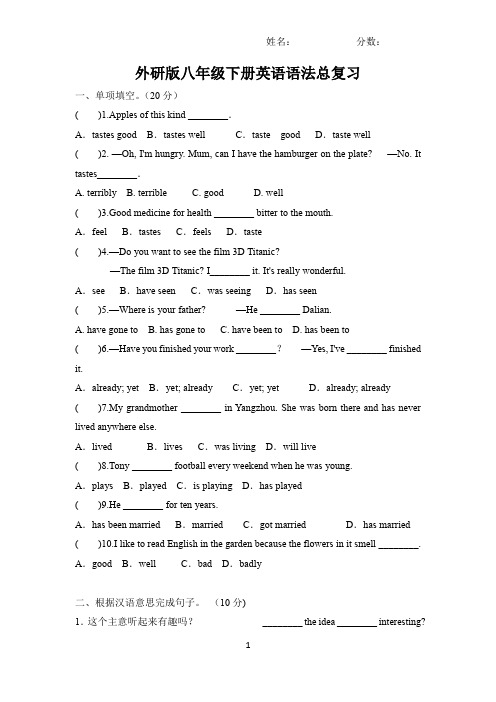
姓名:分数:外研版八年级下册英语语法总复习一、单项填空。
(20分)()1.Apples of this kind ________.A.tastes good B.tastes well C.taste good D.taste well()2. —Oh, I'm hungry. Mum, can I have the hamburger on the plate? —No. It tastes________.A. terriblyB. terribleC. goodD. well()3.Good medicine for health ________ bitter to the mouth.A.feel B.tastes C.feels D.taste()4.—Do you want to see the film 3D Titanic?—The film 3D Titanic? I________ it. It's really wonderful.A.see B.have seen C.was seeing D.has seen()5.—Where is your father? —He ________ Dalian.A. have gone toB. has gone toC. have been toD. has been to()6.—Have you finished your work ________?—Yes, I've ________ finished it.A.already; yet B.yet; already C.yet; yet D.already; already()7.My grandmother ________ in Yangzhou. She was born there and has never lived anywhere else.A.lived B.lives C.was living D.will live()8.Tony ________ football every weekend when he was young.A.plays B.played C.is playing D.has played()9.He ________ for ten years.A.has been married B.married C.got married D.has married ()10.I like to read English in the garden because the flowers in it smell ________. A.good B.well C.bad D.badly二、根据汉语意思完成句子。
八年级下英语(外研版)知识点复习大全整理编辑版

八年级下英语(外研版)知识点复习大全整理编辑版By Assistant一、语法知识点复习1. 时态综合复习八年级下学期英语主要涉及以下时态: - 一般现在时 - 一般过去时 - 一般将来时 - 现在进行时 - 过去进行时 - 一般过去将来时 - 现在完成时 - 过去完成时 - 将来完成时2. 语法点复习•名词性从句•定语从句•状语从句•主谓一致•被动语态•情态动词•祈使句•感叹句二、词汇知识点复习1. 单词复习涉及下列重点单词: - communicate - destination - environment - exercise - foreign - generation - host - improve - journey - knowledge - life - matter - natural - offer - pollution - quickly - reason - support - understand - valuable2. 词组和短语复习涉及下列重点词组和短语: - get in touch with - look forward to - pay attention to - take care of - at the age of - make a decision - make friends with - on the other hand - out of control - regardless of - look after - a number of - according to - make progress - take part in - out of the blue - as much as - as a result三、句型知识点复习1. 基本句型复习八年级下学期英语主要涉及以下基本句型: - 主语 + 谓语 + 宾语 - 主语 + 谓语 + 宾语 + 宾语补足语 - 状语 + 主语 + 谓语 +宾语 - 主语 + 不及物动词 - 主语 + be 动词 + 表语 - There be 句型2. 祈使句复习八年级下学期英语主要涉及以下祈使句型: - 动词原形 + 其他 - Let’s + 动词原形 - Don’t + 动词原形 - 动词原形 + you四、阅读理解复习1. 阅读理解题型涉及以下阅读理解题型: - 判断正(T)误(F) - 单项选择 - 多项选择 - 填空题 - 翻译题2. 阅读技巧复习•扫读文章,了解大意•根据题目要求有针对性地阅读•注意关键词和上下文推理•理解文章结构,找出主题句•注意文章细节和重点信息五、写作技巧复习八年级下学期英语写作主要涉及以下技巧: - 书信写作 - 日记写作 - 演讲稿撰写 - 叙述性写作 - 说明性写作 - 议论性写作 - 表达观点和理由 - 使用适当的连接词和句型六、听力技巧复习八年级下学期英语听力主要涉及以下技巧: - 听力材料预览,建立主题概念 - 注意听力材料中的数字、时间、地点等关键信息 - 关注说话者的语气、语调和强调 - 学会提取关键词,帮助理解 - 熟悉常见听力题型,掌握解题技巧七、口语表达复习八年级下学期英语口语主要涉及以下表达方式和技巧: - 打电话 - 邀请和接受邀请 - 描述外貌、性格、日常活动等 - 询问和提供帮助 - 表达喜欢、讨厌、兴趣等情感 - 表达感谢和道歉 - 提出建议和意见 - 提问和回答问题以上是八年级下英语(外研版)知识点复习的大全整理编辑版,希望对你的复习有所帮助!。
外研版八级英语下期末复习各模块语法专练

外研版八年级英语下语法专练Module 1 感官动词1. Mr White looks ______.A. friendlyB. wonderfullyC. pleasantlyD. nicely2. This shirt ______ as if it is made of cotton (棉花).A. isB. looksC. feelsD. seems3. These apples taste ______.A. to be goodB. to be wellC. wellD. good4. The flowers in the garden ______ sweet.A. soundB. tasteC. becomeD. smell5. You ______ very pale. Do you feel sick?A. lookedB. lookC. lookingD. are looked6. Harry is older than I. But he ______ younger than I.A. lookB. looksC. lookedD. looking7. It ______ like the singing of the birds.A. soundsB. looksC. smellsD. tastes8. The children all looked ______ at the broken model plane and felt quite ______.A. sad ; sadB. sadly ; sadlyC. sad ; sadlyD. sadly ; sad9. This kind of paper ______ soft.A. feelB. feltC. is feelingD. feels10. Coffee is ready. How nice it ______! Would you like some?A. looksB. smellsC. soundsD. feelsModules 2-4 现在完成时Ⅰ.用所给动词的适当形式填空1. ─______ Sally ______ (visit) China?─No, she hasn’t.2. So far we ______ (learn) more than two thousand English words.3. Have you ever ______ (have) Indian food?4. Alice ______ (not see) the film before, but her sister ______ (see) it two days ago.5. Jack ______ (begin) to collect stamps in 2001. He ______ (collect) a lot of stamps so far.Ⅱ.单项选择6. ─Is Miss Green in?─Sorry, she ______ New York on business.A. goes toB. went toC. has gone toD. has been to7. ─Have you seen the film?─______. It was great.A. Yes, I have.B. Yes, I am.C. No, I don’t.D. No, I haven’t.8. Helen loves to talk about travel. She ______ many places.A. has gone toB. has been toC. has gone forD. has been from9. ─You seem to know much about the city.─That’s right. I ______ it three times.A. visitedB. had visitedC. have visitedD. will visit10. ─Why are you standing here, Mrs White?─I’m waiting for my son. He ______ back from school.A. hasn’t comeB. won’t comeC. doesn’t comeD. didn’t come11. ─______ you ever ______ to the US?─Yes, twice.A. Have ; goneB. Have ; beenC. Do ; goD. Were ; going12. They ______ most of the universe so far.A. have visitedB. visitedC. have visited toD. visiting13. ─Have you ever been to Water Park, Tom?─No, I’ve ______ been there.A. everB. alreadyC. neverD. just14. The famous writer ______ one new book in the past two years.A. is writingB. was writingC. wroteD. has written15. He ______ to learn English in 1998.A. has begunB. have begunC. beganD. begins16. When he arrives at the bus stop, the bus ______ for 20 minutes.A. has leftB. had leftC. has been awayD. had been away17. Tom is ill in hospital. He ______ a cold for several days.A. isB. catchesC. has caughtD. has had18. The factory ______ since the February of 1988.A. has been openB. has o penedC. was openD. opened19. Mary and Rose ______ friends since they met in 2000.A. have madeB. have beenC. madeD. have become20. The dog ______ for two days.A. diedB. has been deadC. has been deathD. diesModule 5 一般现在时,一般过去式和现在完成时的区分Ⅰ. 单项选择1. When ______ this accident ______ ?A. was ; happenedB. has ; happenedC. did ; happenD. was ; happen2. I won’t go to see the film tonight. Because I ______ my ticket.A. losesB. have lostC. will lostD. lose3. My grandpa ______ for half a year.A. has been deadB. diedC. was deadD. has died4. My uncle ______ the Party five years ago.A. took part inB. has joinedC. had been inD. joined5. Every morning, my mother ______ breakfast for me.A. preparesB. prepareC. preparedD. preparingⅡ. 用所给动词的适当形式填空6. The girl ______ (teach) us English on Sundays.7. Tom and Mary ______ (come) to China last month.8. My parents ______ (give) me ten yuan every week.9. We ______ (see) several members of the family since we ______ (arrive).10. ─______ you ______ (clean) the classroom?─Yes, I have.─When ______ you ______ (clean) it?─I ______ (clean) it an hour ago.Module 6 简单句的基本句型Ⅰ. 单项选择1. —Dinner is ready. Help yourself!—Wow! It ______ delicious. You are really good at cooking.A. looksB. soundsC. tastesD. feels2. Mother asks me ______ computer games before finishing my homework.A. not playB. to not playC. not to playD. to playing3. The man downstairs found ______ very difficult to get to sleep.A. themB. thatC. whatD. it4. On Sunday I often stay at home and do some ______.A. readB. readsC. readingD. to read5. He ______ coffee at all. He ______ tea.A. doesn't like , prefersB. likes , doesn't preferC. would like , not prefersD. prefers , doesn’t likeⅡ. 用所给动词的适当形式填空6. There ______ (be) a desk and some chairs in the classroom.7. Don’t make your sister ______ (cry) again.8. I often see the children ______ (play) basketball on the playground.9. The first book ______ (come) out in 2002.10. This pair of shoes ______ (feel) tight.Module 7 并列复合句Ⅰ. 单项选择1. “Are you going to eat here ______ take it away?” asked the waiter.A. andB. soC. orD. but2. Tom isn’t good at playing football, ______ he enjoys watching football matches.A. orB. andC. soD. but3. We are going to the bookstore in Tony’s car. You can come with us ______ you can meet us there later.A. butB. andC. orD. then4. Money is important, ______ it can’t buy everything.A. andB. butC. soD. or5. I help him ______ he helps me, we help each other.A. A butB. andC. orD. untilⅡ.用并列连词but, and 或or填空6. She tried hard, ______ she was unsuccessful.7. Put on more clothes, ______ you may catch a cold.8. Study hard, ______ you are sure to have a good result in the test.9. He knew nothing against the man, ______ he didn’t trust him.10. Hurry up, ______ we’ll be late.11. Lingling doesn’t have sisters ______ brothers.12. Sam is a waiter, ______ he really wants to be a singer.13. He sent me a card ______ I liked it very much.14. Which sport do you prefer, volleyball ______ baseball?15. It’s getting dark, ______ they’re still working.Modules 8-10 宾语从句Ⅰ. 单项选择1. He said ______ he wouldn’t be fre e until tomorrow afternoon.A. whichB. thatC. whereD. if2. He said he ______ three English songs since he came here.A. learnedB. had learnedC. would learnD. has learned3. Mr White said that he ______ English at a middle school in Beijing.A. teachB. teachesC. teachingD. taught4. Her brother said that he ______ the club in 2013.A. has joinedB. joinedC. joinD. joins5. They told the children that summer ______ after spring.A. comesB. comeC. has comeD. came6. ─Could you tell us how long ______?─About three days.A. does the sports meeting lastB. the sports meeting lastC. will the sports meeting lastD. the sports meeting will last7. I want to know______.A. what was his nameB. what's his nameC. that his name isD. what his name is8. The teacher told us that light ______ much faster than sound.A. travelsB. traveledC. would travelD. had traveled9. Do you know if ______ back next week? If he _____ back, please let me know.A. he comes, will comeB. will he come, comesC. he will come, comesD. he will come, will come10. Mr King didn’t know ______ yesterday evening.A. when does his son come homeB. when his son comes homeC. when did his son come homeD. when his son came home11. Tomorrow is Father’s Day. I don’t know ______.A. what can I do for my fatherB. what I will get for my fatherC. where I went with my fatherD. where will I go with my father12. ─Can you tell me ______ the prize, Tom?─Last year.A. when you gotB. when did you getC. when will you getD. when you will get13. ─I wonder ______ she will be able to come back from Hong Kong.─Maybe tomorrow morning.A. whenB. whereC. howD. whether14. Miss Green didn’t tell us ______ in 2009.A. where does she liveB. Where she livesC. where did she liveD. where she lived15. Can you tell me if it ______ tomorrow?A. rainsB. is rainingC. will rainD. rain16. ─What did the teacher say just now?─He said that the earth _____ round the sun.A. goB. goesC. goingD. will go17. The girl wanted to know ______.A. whose digital camera it isB. how much did the digital camera costC. if the digital camera was made in JapanD. where her father will buy her a digital camera18. ─What did your parrot say, Bill?─It asked us ______ today.A. what was the weather likeB. what the weather was likeC. what does the weather likeD. what did the weather like19. ─Do you know ______? I’m going to visit him.─Sorry, I don’t know.A. which school does Peter work atB. which school did Peter work atC. which school Peter works atD. which school Peter worked at20. ─I don’t know if he ______ to Kate’s birthday party.─He’s sure to go because he ______ her very well.A. goes ; knowsB. will go ; knowsC. goes ; will knowD. will go ; will know21. I’d like to know ______.A. when will he give back the tapeB. whether has he received higher educationC. that he has been busyD. whether she will join in our English evening22. He asked ______.A. what are they doing over thereB. what were they doing over thereC. what they are doing over thereD. what they were doing over there23. I don’t remember ______ the book yesterday.A. where I putB. where did I putC. where will I putD. where I will put24. When I was only a child, my mother said that the earth ______ bigger than the moon.A. wasB. wereC. had beenD. is25. ─Do you know ______?─Yes, I do. He went by bike.A. whether Paul will go to the party or notB. when will Paul go to the partyC. how Paul went to the partyD. how did Paul go to the partyⅡ. 用所给动词的适当形式填空26. The radio says it ______ (be) cloudy tomorrow.27. He said he ______ (go) there three years ago.28. Tom says that they ______ (play) basketball at six o’clock yesterday evening.29. I hear they ______ (return) it already.30. I think they ______ (talk) about the murder now.31. He says he ______ (be) born in Jinan.32. He told me there ______ (be) twelve months in a year.33. She hears that we ______ (have) an English test next week.34. Tom says he ______ (go) there last night.35.The geography teacher told us water ______ (cover) most of the earth.外研版八年级英语下语法专练参考答案Module 1感官动词1-5 ACDDB 6-10 BADDBModule 2-4现在完成时1.Has ; visited2.h ave learnt (learned)3.had4.hasn’t seen ; saw5.began ; has collected 6-10 CABCA 11-15 BACDC 16-20 CDABBModule 5一般现在时,一般过去式和现在完成时的区分1-5 CBADA 6.teaches 7.came 8.give 9.have seen ; arrived 10.Have ; cleaned ; did ; clean ; cleanedModule 6简单句的基本句型1-5 CCDCA 6.is 7.cry 8.play 9.came 10.feelsModule 7并列复合句1-5 CDCBB 6.but 7.or 8.and 9.but 10.or 11.or 12.but 13.and 14.or 15.but Modules 8-10 宾语从句1-5 BBDBA 6-10 DDACD11-15 BAADC 16-20 BCBCB 21-25 DDADC 26.will be 27.went 28.were playing 29.have returned 30.are talking 31.was 32.are 33.will have 34.went 35.covers。
外研社八年级英语下册语法专题复习

语法专题Module 1简单句:由一个主语(或并列主语)和一个谓语(或并列谓语)构成。
一. 五种基本句型:1.主语+系动词+表语(S+V+P)He is happy.2.主语+不及物动词+(状语)( S+V ) He is swimming.3.主语+及物动词+宾语+(状语)( S+V+O ) I saw him just now.4.主语+及物动词+间接宾语+直接宾语( S+V+IO+DO ) She lent me a bike, 主语+及物动词+直接宾语+间接宾语( S+V+DO+IO ) She lent a bike to me.5.主语+及物动词+宾语+宾语补足语( S+V+O+OC) The good news made us happy. 二. 练习:写出下列句子的基本成分。
1.He likes music very much.2.The soup tastes salty.3.She works very hard.4.My teacher asked me to come a little earlier next time.5.My father bought me a computer.Module 2宾语从句:是一个复合句,复合句也称主从句,即主句和从句。
1. 定义:在句子充当宾语的从句如:He says that he is going to the cinema.The teacher told us that the earth goes around the sun.2. 结构:(1)主句+that+从句(that没有意义,可省略)(2)主句+if/ whether…or not (是否)+从句(3)主句+疑问词(what,where,how,why…)+从句如:I believe (that)we will become good friends.我相信我们会成为好朋友。
外研版英语八年级下册重要语法点复习课件

Some are watching TV, _a_n_d_ others are
listening to the radio. (2)_选__择__关__系___
You can go with us, _o_r_ you can go alone. (3)__转_折__关__系___
She was tired, _b_u_t_ she didn’t stop running. (4)_因__果__关__系___
It’s raining hard, s_o_ we have to stay at home.
C A
A B
C C B
简单句句型
1. 主语 + 系动词 + 表及语物+动(带状宾语语)(即名 2. 主语 + 谓语(不及词物或V代.)词+等()状;语不)及物 3.(状语+)主语 + 谓动语词(不及能直物接V.带)宾+语宾。语
A. popular
B. more popular
C. most popular D. the most popular
5. We should take care of the earth _______ we can make a better world to live in.
A. so that B. until C. even if D. while
3. I think tea will taste better _______ some milk in it.
A. for B. with C. from D. at
八年级外研版英语下册语法知识点汇总

八年级外研版英语下册语法知识点汇总1. 主系表结构主系表结构是英语句子中最简单、最基本的结构之一,指由主语、系动词和表语三个成分构成的句子结构。
1.1 系动词1.2 表语表语可以是形容词、名词、代词、副词或介词短语。
2. 并列连词并列连词用来连接并列的句子或短语,表示相同的意思或者是相似的含义。
2.1 常用的并列连词常用的并列连词有:and、or、but、so、yet等。
3. 从句从句在句子中充当一个独立的语法单位。
通常它们包括一个主语和一个谓语,但是它们不能单独存在,必须依存于另一个主句之间。
从句可以被用作修饰、插入或补充相关信息。
3.1 名词性从句名词性从句可以充当名词,在句子中作主语、宾语或表语。
3.2 定语从句定语从句用来描述一个名词或代词,并修饰它。
3.3 状语从句状语从句用来修饰主句,并表示一些条件、时间、原因、结果等关系。
4. 时态英语时态分为简单现在时、现在进行时、一般过去时、过去进行时、过去完成时、一般将来时,以及现在完成时。
4.1 简单现在时用于表示现在的状态、定期事件、惯或真理。
4.2 现在进行时用于表示当前正在进行的动作。
4.3 一般过去时用来描述过去的事情或者状态。
4.4 过去进行时用于描述在过去某一时刻正在发生的事情。
4.5 过去完成时用于描述在过去某个时刻已经完成的动作。
4.6 一般将来时用于表示将要发生的动作或状态。
4.7 现在完成时用于描述已经发生的事情或状态,可能会持续到现在。
以上是本文的语法知识点汇总,当然英语语法是一个很庞大的领域,还有很多没有涉及到,请大家继续学习深入了解。
外研版八年级(下册)英语知识语法汇总
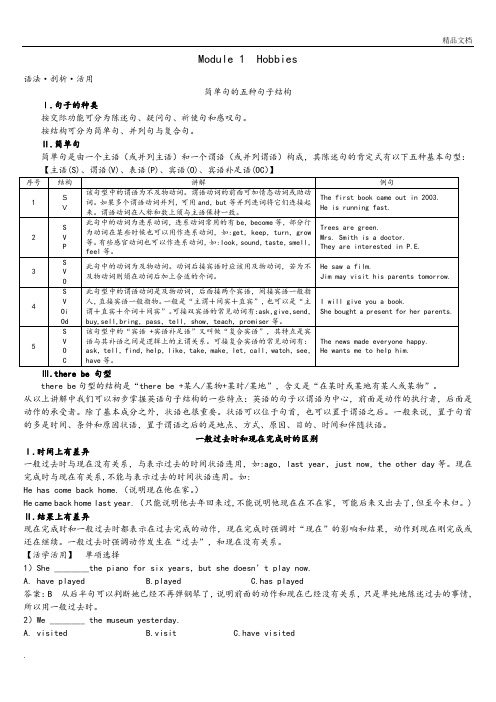
Module 1 Hobbies语法·剖析·活用简单句的五种句子结构Ⅰ.句子的种类按交际功能可分为陈述句、疑问句、祈使句和感叹句。
按结构可分为简单句、并列句与复合句。
Ⅱ.简单句简单句是由一个主语(或并列主语)和一个谓语(或并列谓语)构成,其陈述句的肯定式有以下五种基本句型:Ⅲ.there be 句型there be句型的结构是“there be +某人/某物+某时/某地”,含义是“在某时或某地有某人或某物”。
从以上讲解中我们可以初步掌握英语句子结构的一些特点:英语的句子以谓语为中心,前面是动作的执行者,后面是动作的承受者。
除了基本成分之外,状语也很重要。
状语可以位于句首,也可以置于谓语之后。
一般来说,置于句首的多是时间、条件和原因状语,置于谓语之后的是地点、方式、原因、目的、时间和伴随状语。
一般过去时和现在完成时的区别Ⅰ.时间上有差异一般过去时与现在没有关系,与表示过去的时间状语连用,如:ago,last year,just now,the other day等。
现在完成时与现在有关系,不能与表示过去的时间状语连用。
如:He has come back home.(说明现在他在家。
)He came back home last year.(只能说明他去年回来过,不能说明他现在在不在家,可能后来又出去了,但至今未归。
) Ⅱ.结果上有差异现在完成时和一般过去时都表示在过去完成的动作,现在完成时强调对“现在”的影响和结果,动作到现在刚完成或还在继续。
一般过去时强调动作发生在“过去”,和现在没有关系。
【活学活用】单项选择1)She ________the piano for six years,but she doesn’t play now.A. have playedB.playedC.has played答案:B 从后半句可以判断她已经不再弹钢琴了,说明前面的动作和现在已经没有关系,只是单纯地陈述过去的事情,所以用一般过去时。
- 1、下载文档前请自行甄别文档内容的完整性,平台不提供额外的编辑、内容补充、找答案等附加服务。
- 2、"仅部分预览"的文档,不可在线预览部分如存在完整性等问题,可反馈申请退款(可完整预览的文档不适用该条件!)。
- 3、如文档侵犯您的权益,请联系客服反馈,我们会尽快为您处理(人工客服工作时间:9:00-18:30)。
语法专题Module 1简单句:由一个主语(或并列主语)和一个谓语(或并列谓语)构成。
一. 五种基本句型:1.主语+系动词+表语(S+V+P)He is happy.2.主语+不及物动词+(状语)( S+V ) He is swimming.3.主语+及物动词+宾语+(状语)( S+V+O ) I saw him just now.4.主语+及物动词+间接宾语+直接宾语( S+V+IO+DO ) She lent me a bike, 主语+及物动词+直接宾语+间接宾语( S+V+DO+IO ) She lent a bike to me.5.主语+及物动词+宾语+宾语补足语( S+V+O+OC) The good news made us happy.二. 练习:写出下列句子的基本成分。
1.He likes music very much.2.The soup tastes salty.3.She works very hard.4.My teacher asked me to come a little earlier next time.5.My father bought me a computer.Module 2宾语从句:是一个复合句,复合句也称主从句,即主句和从句。
1. 定义:在句子充当宾语的从句如:He says that he is going to the cinema.The teacher told us that the earth goes around the sun.2. 结构:(1)主句+that+从句(that没有意义,可省略)(2)主句+if/ whether…or not (是否)+从句(3)主句+疑问词(what,where,how,why…)+从句如:I believe (that)we will become good friends.我相信我们会成为好朋友。
He asks whether/ if we will go fishing on Sunday.他问周日我们是否会出去钓鱼。
I understand why they like computer games so much.我理解他们为什么如此喜欢电脑游戏。
3. 时态:(1)主句是一般现在时,从句可以是任何时态。
I hear that Peter bought a new computer yesterday.(主句用一般现在时,从句用过去时)Tom wants to know what his brother will do next Sunday.(主句用一般现在时,从句用将来时)The little girl can show me where she lives.(主句用一般现在时,从句也用一般现在时)2. 如果主句的时态是一般过去时,宾语从句只能用过去的某种时态如:David told me that he was very tired.(主句用一般过去过去时,从句也用过去时)3. 如果宾语从句所陈述的是客观真理,其时态常用一般现在时。
例如:如:The teacher told us that the earth goes around the sun.(主句用一般过去时,从句用现在时)如何改为宾语从句(三关)1. 引导词关①陈述句,引导词用that(that在口语或非正式文体中常省略);②一般疑问句,引导词用if/whether;③特殊疑问句,引导词用由疑问词转换而来的疑问代词/副词。
2. 语序关①陈述句变为宾语从句,语序不变,即仍用陈述语序。
如:He is an honest boy. The teacher said.→The teacher said(that)he was an honest boy.②一般疑问句和特殊疑问句变为宾语从句,语序变为陈述语序。
如:Does he work hard?I wonder.→I wonder if/whether he works hard.When did he leave?I don’t know.→I don’t know when he left.3. 时态关①如果主句是现在的时态,从句的时态可根据实际情况而定。
如:②如果主句是过去的某种时态,那么从句的时态一定要用过去的某种时态。
如:注意:如果宾语从句表述的是客观真理、自然现象等时,不管主句是什么时态,从句都要用一般现在时。
练习题1. Miss Green didn’t tell us _____ in 2002.A. where does she liveB. Where she livesC. where did she liveD. where she lived2.I don’t know when ____.A.will the train leaveB. the train will leaveC. would the train leaveD. the train leave3.---We don’t know _____.---It is said that he was born in Sweden.A.what he isB. if he lives hereC. where he comes fromD. which country is he from4. We're not sure if it ___________ tomorrow. If it ___________,we won’t climb the South Hill.A. will snow;snowsB. will snow;will snowC. snows;snowsD. snows;will snowModule 3动词不定式(to do)和动名词(v-ing)有些动词后面需加to do或-ing来把意思补充完整。
接to do的单词多为“打算”、“计划”、“希望”之类的动词,而这些动词都表示未来。
接-ing形式的动词要么表示是正在进行,要么表示一般性或经常性行为。
有的动词既可以接to do,也可以接-ving。
一.接to do的动词有:(1)四个希望两答应:hope/ want/ wish/ would like to----agree/ promise(2)两个要求加拒绝:demand/ ask/ refuse(3)设法学会做决定:manage/ learn/ decide(4) 不要假装在选择:pretend/ choose二. 接-ing的动词有:enjoy/ finish/ practise/ keep/ be busy/ feel like doing sth三. 既可以接to do,也可以接-ving的动词有hate, like, love, begin/start(意思一样),remember, forget, continue/ go on, stop, try,mean,regret(意思不一样)Remember to do sth 记得去做某事remember doing sth 记得做过某事Forget to do sth 忘记去做某事forget doing sth忘记做过某事Stop to do sth 停止正在做的事去做另一件事stop doing sth 停止正在做的事Continue/ go on to do 继续做另一件事Continue/ go on doing sth 停止正在做的事Try to do sth 努力设法做某事try doing sth 试着做某事Mean to do sth 意味着做某事mean doing sth 打算做某事Regret to do sth 对将要做的事表示遗憾regret doing sth 对已做的事感到后悔四. 练习:用所给词的适当形式填空。
1.Would you like _____________ (have) a cup of tea?2.I’m very tired, let’s stop _____________ (have) a rest.3.I asked why he smiled, but he couldn’t remember _________________ (smile) at me.4.He wants _____________ (buy) a new bike.5.You must keep _______________ (practice) ______________ (speak) English every day.6.Have you finished _____________ (read) the book?7.I decide ______________ (visit) the Great Wall this holiday.8.My sister enjoys _______________ (listen) to music.9.He learnt ______________ (swim) all by himself.10.My father agreed ____________ (buy) me a computer.11.I forgot _____________ (close) the door yesterday.12.I hate ______________ (lose).13.The teacher is coming, we stop _____________. (talk)14.We tried ______________ (finish) the work on time.15.Sally refused ______________ (play) during the final practice.16.He offers ____________ (help) me with the work.17.She can’t afford ______________ (buy) a dictionary.18.I hope _____________ (go) abroad.19.Da Wei asked ____________ (play) the computer game on my father’s computer.20.He started _______________ (make) his own radio programmer at the age of fifteen.Module 4-5由if(如果)引导的条件状语从句(在某种条件下某事可能发生)1.句子结构(1)If从句+主句(2)If从句+祈使句(以动词原形开头)2.位置:if从句可放句首,也可放主句后面; 若If条件句放句首,从句可加逗号。
